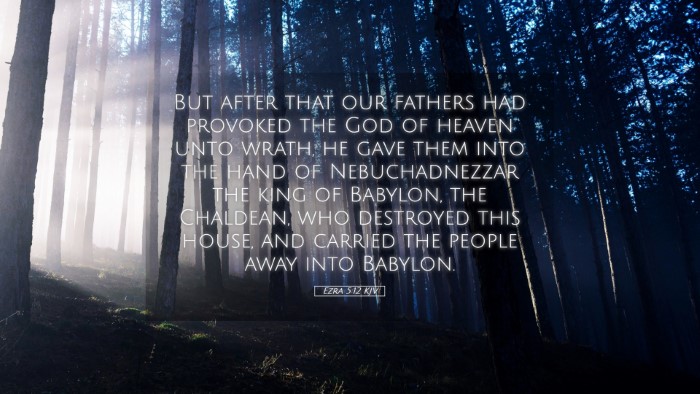Old Testament
Genesis Exodus Leviticus Numbers Deuteronomy Joshua Judges Ruth 1 Samuel 2 Samuel 1 Kings 2 Kings 1 Chronicles 2 Chronicles Ezra Nehemiah Esther Job Psalms Proverbs Ecclesiastes Song of Solomon Isaiah Jeremiah Lamentations Ezekiel Daniel Hosea Joel Amos Obadiah Jonah Micah Nahum Habakkuk Zephaniah Haggai Zechariah MalachiEzra 5:12
Ezra 5:12 KJV
But after that our fathers had provoked the God of heaven unto wrath, he gave them into the hand of Nebuchadnezzar the king of Babylon, the Chaldean, who destroyed this house, and carried the people away into Babylon.
Ezra 5:12 Bible Commentary
Bible Commentary on Ezra 5:12
Verse (ESV): "But because our fathers had angered the God of heaven, he gave them into the hand of Nebuchadnezzar king of Babylon, the Chaldean, who destroyed this house and carried away the people to Babylon."
Contextual Overview
In Ezra 5:12, the context reveals a significant moment in the history of the Israelites as they returned to Jerusalem after the Babylonian exile. This verse is part of a larger narrative that illustrates the consequences of disobedience to God, encapsulating themes of judgment, repentance, and restoration. The verse serves as a poignant reminder of how Israel's past sins led to their forfeiture of land and temple, as they are now in the process of rebuilding both.
Theological Implications
Ezra 5:12 offers rich theological insights into the nature of divine judgment and mercy. The verse emphasizes that their fathers' actions incited the wrath of God, leading to captivity and destruction. This understanding is crucial for pastors and theologians as it underscores the belief in a responsive God who acts according to His covenant promises, highlighting both His justice and His grace.
Divine Judgment
The mention of the "anger of the God of heaven" reflects a serious theological principle: God's response to sin is justly severe. All three commentators—Matthew Henry, Adam Clarke, and Albert Barnes—interpret this as a faithful affirmation of God's character. Each emphasizes that this divine anger is not arbitrary but rather a response to unfaithfulness, reflecting God's holiness and the seriousness of sin.
Historical Consequences
- Matthew Henry: He notes that the destruction of the temple was a direct consequence of Israel's longstanding rebellion against God. They forsook the worship of Yahweh, thus inviting calamity upon themselves.
- Albert Barnes: Barnes emphasizes the historical context, clarifying that the captivity served as a harsh but necessary reprimand for Israel's persistent idolatry and moral decay.
- Adam Clarke: Clarke posits that the sovereign will of God was at work, suggesting that God allowed Nebuchadnezzar to act as His instrument of judgment, which should instill a sense of reverence towards God's authority.
Restoration and Hope
While this passage questions Israel's past, it simultaneously lays groundwork for hope and restoration. The very act of returning and rebuilding suggests divine mercy is also at play. As noted by Henry and Clarke, the return from Babylon signifies not just a physical restoration but a spiritual renewal, fostering an opportunity for the community to recommit itself to the covenant with God.
Applications for Today
Ezra 5:12 speaks profoundly to contemporary matters within church communities, reminding us of the importance of fidelity to God. The lessons derived from this passage can be distilled as follows:
- Recognition of Consequences: Just as Israel faced judgment, communities today must introspect to identify ways they may have strayed and address the need for repentance.
- God’s Promises of Restoration: This verse underscores that even in judgment, God provides a pathway for redemption. Pastors can foster hope by teaching congregants about God's faithfulness to those who return to Him.
- The Importance of Remembrance: The narrative invites believers to remember their history—the faithfulness of God amidst human failure—calling for a collective memory that shapes spiritual identity.
Conclusion
In summary, Ezra 5:12 encapsulates profound lessons about God’s justice, historical consequence, and merciful restoration. For pastors, students, and biblical scholars, it serves as a vital reminder of the importance of holding fast to God’s commandments and exemplifying faithfulness within their communities. Through the insights of public domain commentaries, we appreciate the layered meanings of this scripture and are encouraged to apply its truths to our lives and ministries.


